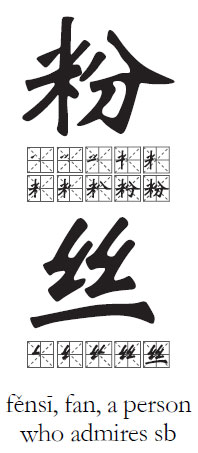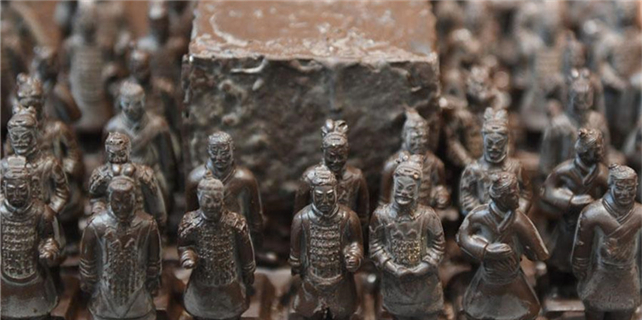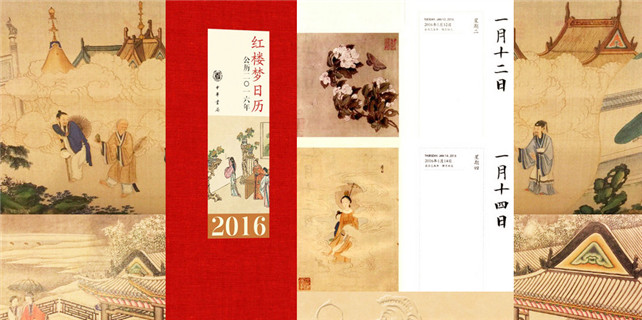Fanning the flames of obsession
The phrases you'll need to tackle a severe case of celebrity worship
If you have any interest at all in pop culture, you'll have come across people like this: They are the most loyal champions any celebrity could wish for. They are, of course, the fans.
But apart from debating the merits of their idols on social media and injecting billions of yuan into the media industry each year, they are also the fountainhead of a lot of internet slang.
The word 粉丝 (fěnsī), literally "rice noodles", is the Chinese term for "fans" (say it out loud a few times to find out why). These days, there is a new expression - 迷妹 (mímèi), literally "obsessed sisters", and its counterpart, "obsessed brothers" (迷弟, mídì), which are considered more accurate descriptions of the level of these individuals' mania.
|
Chinese fans welcome Hollywood star Natalie Portman at the Beijing International Film Festival in April. Zhu Xingxin / China Daily |
To shore up your credibility as an adoring fan, there are certain phrases you have to master in order to lavish praise on your idols, defend them to the hilt and swear eternal loyalty and love.
As far as fans are concerned, their idols are perfect. To their admirers, all pop stars are good-looking, have good acting or singing skills, work hard and treat fans well.
Complimenting the object of your admiration usually starts with appearance. First, you should learn the word 颜值 (yánzhí), literally meaning "face value". The better-looking someone is, the higher the face value. Here are two phrases that have been around for a while but can be very useful: 颜值爆表 (yánzhí bàobiǎo), which means "the face value has destroyed the charts", and 颜值逆天 (yánzhí nìtiān), meaning "the face value goes against the laws of nature".
Sometimes you see the four-character phrase 美颜盛世 (měiyán shèngshì), literally meaning "beautiful face flourishing era". Don't question the meaning; these are simply four characters that are supposed to make you think of pleasant things, just like the beautiful object of your praise.
Even more confusingly, there is "the spring of the face dog (颜狗的春天 yángǒu de chūntiān)". 颜狗 literally means "face dog", a somewhat self-deprecating term to describe fans who only care about a pop star's appearance. So, the logic goes, a face dog's "spring" comes when they see many beautiful faces (i.e. they are happy). If the whole cast of the film is studded with handsome mugs, fans will exclaim: "This movie is totally the spring of face dogs."
You will also frequently see the word 哭 (kū, cry). In some cases it is not used as a verb but an adverb indicating a description of a high degree. For example, 帅哭 means "extremely handsome" or "so handsome that it makes me cry".
Got that? Now that you've mastered how to fawn over appearances, it's time to comment on the acting:
I am overcome by these acting skills.
Zhè yǎnjì wǒ fú!
这演技我服!

I could feel the good acting even on the other side of the screen.
Gézhe píngmù dōu gǎnshòu dàole yǎnjì!
隔着屏幕都感受到了演技!
I couldn't see any of the actor in the character. Too awesome.
Zài juésè shēnshang wánquán kànbudào běnrén de yǐngzi! Tài zàn le!
在角色身上完全看不到本人的影子!太赞了!
Or singing:
These singing skills have brought me to my knees.
Zhè chànggōng wǒ gěi guì le!
这唱功我给跪了!
I've put the song on a loop. Totally can't stop.
Yǐ kāiqǐ xúnhuán bōfàng! Gēnběn tíng bú xià lái.
已开启循环播放! 根本停不下来!
Some fans truly like the acting or singing; others just believe that, as a fan, it's their obligation to give positive feedback so their idol can bask in its light. This means, of course, that they are also their idol's staunchest defenders against any negative feedback.
To ordinary audiences, the most fanatical admirers of a celebrity are called "brain-damaged fans (脑残粉, nǎocán fěn)." Their favorite shot to fire is the all-purpose line, "Do you know how hard-working he/she is? (你们知道他多努力吗? Nǐmen zhīdào tā yǒu duō nǔlì ma?" When pop stars are criticized for their lack of skill, mocked for poor taste in fashion, or even get caught breaking the law, their fans will use their hard work as the catch-all defense.
But apparently, hard work can't cover everything, especially when the star is involved in serious issues like drugs. In these situations, their loyal 脑残粉 (nǎo cán fěn) will try a different tack - everyone makes mistakes.
He's still just a kid. Why can't we give him a second chance?
Tā hái zhǐ shì ge háizi, wǒmen wèishénme bùnéng zài gěi tā yí cì jīhuì ne?
他还只是个孩子,我们为什么不能再给他一次机会呢?
The general public doesn't usually respond well to these excuses. On social media, you can see as many declarations of love from fans to celebrities that show just how far the obsession can go. They range from the romantic and touching to the deluded and kind of creepy; on the other hand, they work as a declaration of love for someone in your own life.
It was destiny for me to love you.
Xǐhuān nǐ shì mìngzhōngzhùdìng.
喜欢你是命中注定。
I could not be a part of your past, but in your future, I'll be accompanying you to the end.
Nǐ de guòqù wǒ wèinéng cānyǔ, nǐ de wèilái wǒ fèngpéi dǎodǐ.
你的过去我未能参与,你的未来我奉陪到底。
Courtesy of The World of Chinese, www.theworldofchinese.com
The World of Chinese
(China Daily European Weekly 12/16/2016 page23)



















